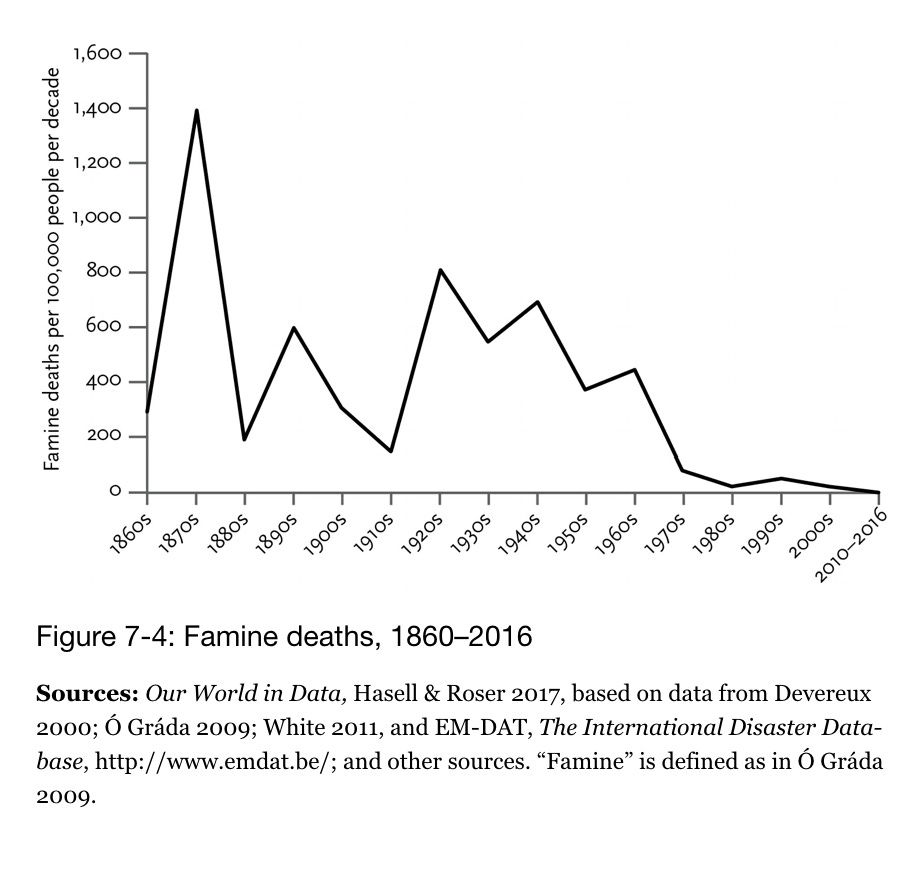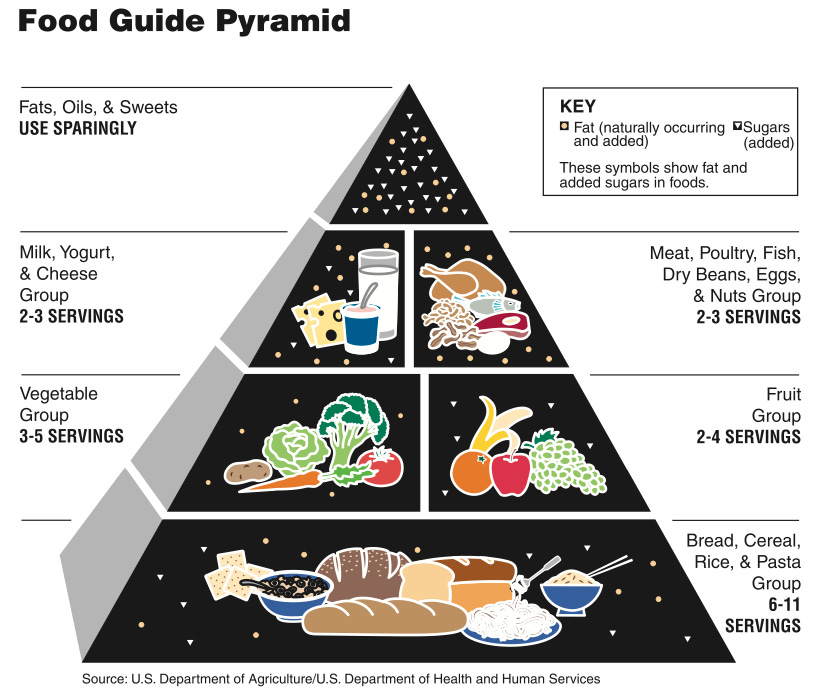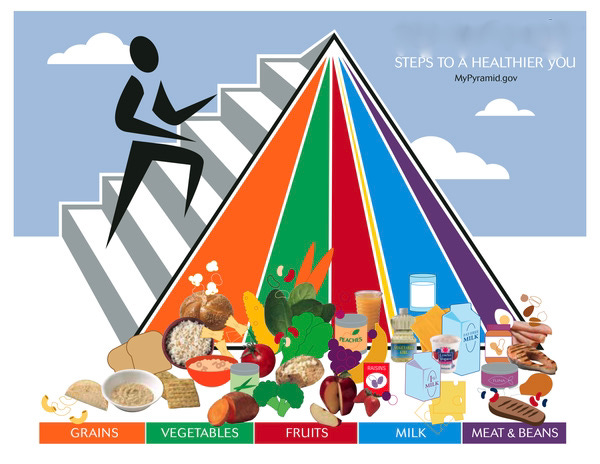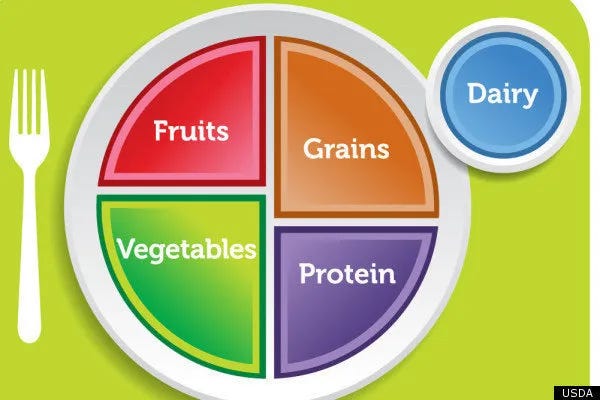Official Diet Recommendations & Obesity -- Guest Post by Robert Yoho
This is excerpted from Hormone Secrets by Robert Yoho, MD, pending publication.
This chapter is the background for the next one about the use of thyroid and other medications to treat weight loss. Obesity is pandemic, and the cause(s) and treatments for both individuals and the world are in question. Likewise, we know little about the optimal diet. We do know that refined sugars and trans (partially hydrogenated) fats damage health and that animal protein and fat cause no special harm.
Agriculture is a great gift that is saving the world. Farm productivity exploded over the past 50 years. Worldwide famine deaths have crashed. The following chart is from Steven Pinker’s phenomenal Enlightenment Now (2018):

Hybrid crops and mechanization have driven up corn yields. There were 20 bushels per acre in 1980, but by 2019 this increased to 160. Other crops show similar trends.
Abundant food has been paralleled by other advances. Global literacy was 55 percent in 1950 and rose by 5 percent a decade after that. It is now 86 percent. No rational person—outside of an oddball billionaire or two—still worries about the “population bomb.” The number of people in the world is projected to be 9.7 billion by 2064, but this will decline to 8.8 billion by 2100.
These trends debunk the media’s disaster-mongering. But against this optimistic tide, we have our obesity. The daily calories supplied by US food producers rose from 2900 per person in 1961 to 3700 today. Adult caloric requirements range from 2000 for sedentary women to about 3000 for a few active adult men. Big Food must either export the excess or force-fed it to us using marketing. In 1980, 15 percent of us were obese, but this number is now a third. Overweight people are another third (CDC figures).
Authorities have recommended low-fat diets for forty years. “Saturated” animal fats increase blood levels of “bad” cholesterol (LDL), which was assumed to be evidence that a high-fat diet caused heart disease. In 1985, the Surgeon General’s Report on Nutrition and Health recommended dietary fat restriction. When the Food Pyramid came out in 1992, these guidelines went mainstream. Later versions were promoted in 2005 and 2011. It sounded sensible enough—the government was trying to help. What could go wrong?

1992

2005

2011
Our obesity began about the same time as the Food Pyramid recommendations for low-fat diets. The for-profit food industry marketed these ideas, peddling cheap manufactured fats and processed sugar under “low fat and cholesterol” labels. The graph below shows that this effort has certainly done us harm and possibly caused our obesity.
Although the consensus is not complete, powerful evidence has developed that we eat too little fat, and that saturated animal fats are safe. Even though fatty meat consumption raises the bad LDL cholesterol, it also raises “good” one, HDL. Dozens of studies have proven that this diet does not cause heart disease itself. Others showed no association with death or stroke, either. And eating less fat encourages carbohydrate consumption, which increases heart disease risk.
Cholesterol numbers are related to heart disease, but changing them with drugs or diet is much less beneficial than originally thought. Statin medications are more evidence of this. These lower the bad LDL cholesterol but do not improve heart attack deaths enough to justify their side effects. (For more, see Butchered by Healthcare. Statins are useful in only a few circumstances.)
The US Department of Agriculture (USDA) and the Food and Drug Agency (FDA) are our food regulators. These are captives of the industrial food manufacturers’ money. (See Martha Rosenberg’s Born With a Health Food Deficiency.) These two organizations, along with their puppet masters from big Food, spread this now-obsolete idea that animal fat causes heart disease. They recommended replacing butter with cheap, processed vegetable oil that is manufactured using high pressure and temperatures. This creates the hazardous “partially hydrogenated” oils and “trans fats” that have infested our foods for a century.
This commercial process transforms cheap vegetable oils into tasty solids with seductive textures and “mouth feel.” These are ideal for cooking because they tolerate high temperatures. When baked into cookies and sweets, they can sit for years in colorful packages on store shelves before becoming rancid. They are commonly found in:
1) Margarine
2) Vegetable shortening (often used in restaurant deep fryers)
3) Many packaged snacks
4) Many commercial baked foods
5) Ready-to-use dough
6) Many fried foods
7) Coffee creamers, dairy, and nondairy
The good news as I write this is that these synthetically altered oils have been partially banned in many countries and some states. The US requires labels and is supposedly phasing them out.
Corn is used to create most of the additives and sugary junk in our packaged food. Although we know refined sugar causes heart attacks, we continue to spend $5 billion a year in corn subsidies. These federal farm supports began ninety years ago as well-meaning attempts to protect farmers from bankruptcy by dampening fluctuations of crop yields and markets. In recent decades, this mutated into a system mandating the overproduction of corn sugar and its products. A few monster agricultural producers pay lobbyists tens of millions of dollars to keep it all going.
The land in the US now devoted to corn is an area 80 percent as large as California. Yet our agriculture produces fewer person-calories per acre than that of other countries because three-quarters of the corn goes to biofuel or animal food. We are depleting resources and destroying natural habitats. This effort has caused or at least contributed to our obesity and heart disease.
Industry gave us a third damaging “food” class—artificial sugars. The first artificial sweetener, saccharin, was invented in the late 1800s and was in common use for most of the 20th century. The FDA banned it in 1977 because it caused cancer in lab rats. Indigestible sugars like this, just like real sugar, stimulate the body to produce insulin, which drops blood sugar and makes people hungry. This promotes a vicious cycle of more junk food purchases and more obesity.
The vegans are vocal, but their evidence is slender. Michael Greger, an influential herbivore, makes convincing, rational arguments favoring vegetable diets and against fat consumption on NutritionFacts.org. His latest book, How Not to Diet, includes over 5000 citations. Some were valid, but others back oddball ideas. For example, Greger reports how consuming chili peppers burns a few extra calories a day.
Greger is an “ethical” vegan. This means he believes animal lives matter and that we are murdering them. A plant-eating friend patiently clarified their doctrine for me. She said that meat-eating increases carbon usage and “all the scientists agree” that we are racing toward planetary apocalypse. If this is true, it renders any other considerations frivolous. My friend adds that because of this, she does not care if these eating habits damage her health.
Although I am not an expert on climate change, my study of healthcare corruption has taught me to doubt conclusions based on small numbers. Likewise, divining the future is a game that most experts lose. I also have suspicions that these scientists are as subject to muddy thinking and bad influences as the people in medicine. And after all the falsehoods the media has fed us recently, I have trouble believing anything they claim as fact. So I leave these considerations to the reader. For myself, I chose not to imagine that I am living in a dystopian science fiction novel.
The “China Study” (the China-Oxford-Cornell Study on Dietary, Lifestyle and Disease Mortality Characteristics in 65 Rural Chinese Counties) was a massive epidemiological investigation of nutrition conducted in the 1980s. It concluded that dining on animals was harmful to the heart and caused cancer. It advocated consuming carbohydrates and, like the other sources of its day, was critical of cholesterol consumption. Vegetable advocates oft quote it.
But the science supporting the superiority of these diets is questionable, and many studies undermine it. A meta-analysis with 37,000 participants showed higher rates of bone fractures and osteoporosis in vegans and vegetarians. They had lower bone density. Another study of 42 European countries showed that the populations that consumed more fat and meats had lower heart disease and death rates than those with higher carbohydrate consumption. An interview study of 1300 Australians found “a vegetarian diet is associated with poorer health (higher incidences of cancer, allergies, and mental health disorders), a higher need for health care, and poorer quality of life.” Vegans have a higher overall death rate (earlier mortality) in both Australia and Britain. Harriet Hall’s article in Science Based Medicine (2013), Death as a Foodborne Illness Curable by Veganism, is a skeptical, comprehensive review.
Our current practice is to eat anything, any time we want. We often consume food from the time we arise until we go to sleep at night—16 hours a day or more. Contrary to the “eat many small meals” myth, this is unhealthy.
Human studies support various types of fasting (see Weightlifting is a Waste of Time, 2020, for many references). During the period that people do not eat, their bodies heal. They produce higher levels of testosterone and growth hormone. These have “anabolic” effects that stimulate muscle growth and fat loss.
Mice experiments on food deprivation have been performed as far back as 1945. One recent study showed extended lifespan and improved health when the animals were fed over eight hours rather than the entire day. The mice lost weight even though the number of calories they consumed was the same.
Humans who have a modicum of restraint can simply eat for 8 hours in a row and then quit, from 11 AM to 7 PM, for example. This has been successful for many if they restrain junk food consumption. Some do well if they just cut out eating after six PM. The next step in a restricted diet is to limit food to two to four hours. This is popularly called “one meal a day” (OMAD). Some people require longer fasting periods of up to several days to see significant weight loss.
These are complex issues with no consensus. John Ioannidis, the renowned Stanford study design expert, says the trials about the effects of diet on health are fundamentally flawed. He believes these are too small, not randomized, or otherwise biased. Observational studies such as the China Study show correlation and not causation. This means that the Chinese likely have less heart disease because of factors other than diet.
To illustrate how little we know about nutrition, diet, and weight loss, see the next chapter’s discussion about the Adkin’s-type diets. These consist solely of meat, eggs, cheese, and fat. According to mainstream medicine, Atkins was discredited (he died, after all). But patients who stick with these restrictions watch their cholesterol fall and can quit most of their diabetes and high blood pressure medications. Some eat hamburger patties from fast-food restaurants, and it works.
What can we conclude?
1) Consuming food all day promotes weight gain and is less healthy than eating only one or a few meals.
3) Both sugars and artificially processed hydrogenated and trans fats cause heart disease. These are everywhere, so we must watch the food labels. For example, there is a lot of sugar in almost all dried cranberries and beef jerky. And if you don’t see your peanut butter ground, it may have partially hydrogenated oils.
4) Animal fat consumption has no special damaging effects on the heart.
5) Monounsaturated fats such as olive, almond, coconut, and avocado oils are traditionally thought the best choices for cooking. The evidence for their superiority to animal fats such as butter is weak, however.
6) Avoid restaurants. They want our business more than they care about our health. Many serve the least expensive and most palatable fats, along with all the sugar possible, and they put salt in everything. This has effects on high blood pressure and stomach cancer.
7) You must ignore tens of thousands of alluring, colorful packages in grocery stores. I am shocked every time I go, and it is getting worse. Check the labels but always remain skeptical. Processed foods are unhealthy and hard to evaluate. Frozen, packaged, and canned foods usually contain undesirable ingredients. If “hydrogenated oil” is listed, it could contain the partially hydrogenated type.
8) Meat, fruit, nuts, dairy, whole grains, and vegetables are likely the best choices. Buy foods you understand and recognize.
Subscribe or donate to support this site and its wholly independent host using credit card or PayPal click here


